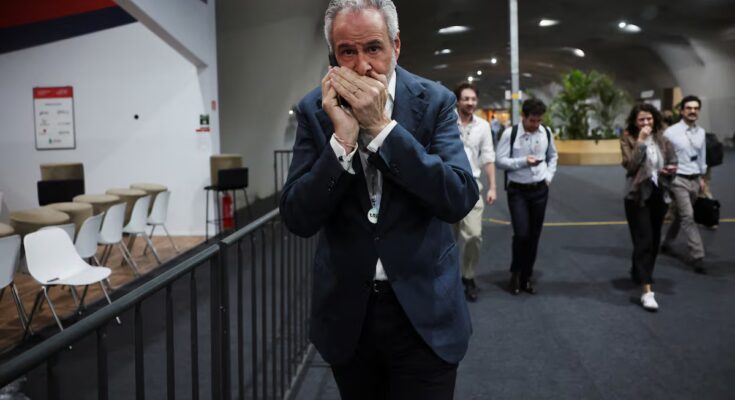After a long night of negotiations behind closed doors at the Belém climate summit, the presidency of this conference, entrusted to Brazil as host country, presented a new set of texts to try to close the meeting, which was supposed to end on Friday. The most controversial issue, which has most aggravated all the negotiations in which almost 200 countries participate, does not appear in the final draft presented by André Corrêa do Lago, the Brazilian diplomat who chairs the summit, and who hopes to see it approved this Saturday. There are no references to the mandate to establish a roadmap to abandon fossil fuels, the main causes of climate change, as the Brazilian president himself, Luiz Inácio Lula da Silva, had proposed to the countries.
All night the countries negotiated and right up to the end they exchanged paragraphs of the final text of the summit, which will have to be adopted this morning in plenary (in Brazil, tares in Spain). The EU, which had insisted, albeit not entirely cohesively, on referring to this roadmap, has finally lent its hand and guaranteed that it will not veto this weak closing statement.
The summit in Brazil gained more and more intensity as it neared its conclusion and the debate over fossil fuels was gaining weight in a conference from which no major headlines were expected. But it was the Brazilian president who, at the beginning of this conference in the Amazon city, launched the idea that a roadmap to abandon fossil fuels should emerge from this meeting. Something that has not closed due to the rejection of the countries most dependent on oil, coal and gas. And because of the lack of strength among the nations that supported this initiative.
Gradually, the idea of the roadmap gained consensus during the summit, to the point that almost 40 countries (including Spain, Colombia, France, Germany, the United Kingdom and Chile, but not the European Union as a whole) signed a document in the final part of the summit in which they defended this plan to put oil, gas and coal under the spotlight.
But in 30 years of UN climate talks and agreements, direct references to fossil fuels have been taboo. Only in Dubai, in 2023, did it mention in the final text that they should be left behind. At that moment the support of the United States and the European Union as a whole was decisive, which did not happen on this occasion.
Now it has been possible to include a mention of this agreement in the final text, which the plenary must support, but without even including the term fossil fuels in the declaration. The creation of a voluntary “Global Implementation Accelerator” is supported, taking into account the “UAE Consensus”. This expression refers to the 2023 declaration in which, among other things, the need to abandon fossil fuels was mentioned for the first and only time, which was not repeated either in 2024 or 2025.
Sara Aagesen, Spain’s Minister for Ecological Transition, regretted being excluded. “We’re not happy,” he said, later adding that at least “the situation hasn’t gone backwards.”
This roadmap was included in the first draft of the final declaration. But it had disappeared from the text presented on Friday morning. And when some countries asked Corrêa do Lago for explanations in a closed-door meeting, he claimed that 80 nations refused to mention fossil fuels. In the lead were the petrostates, especially Saudi Arabia. In Friday’s closed-door meeting, its top representative, Noura Alissa, clashed with Aagesen, who she singled out for his insistence on introducing references to fossil fuels into the text.
The system by which every text and every decision must be agreed as part of the climate change talks at the United Nations is based on consensus, meaning that any of the nearly 200 participating countries can raise their hand and stop everything at the last moment. This system during more than three decades of negotiations meant that the agreements were always lowered.
Saudi Arabia has historically been the country that led a coalition of oil countries that fought to eliminate all mention of fossil fuels. In Belém it happened again. But, furthermore, other large countries, such as China or Russia, have not shown their support for the idea of a road map that leaves them behind.



